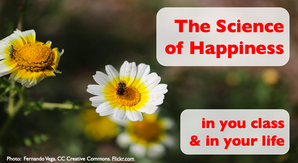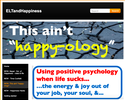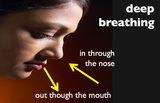- Home
- Awe (NEW 7/24)
- This ain't "happy-ology"...
- Philippiness 2/23 Science of Happiness - Class & Life
- SofH - class & life Spring 2022
- NEW - Time Confetti
- NEW - Happiness Hacks
- NEW - The Power of Fun
- Getting started
- Introducing happiness
- Main Activity Download Center
- 10 Minutes for Happiness (quick tasks)
- Happiness Haiku (consolidation)
- Positive brain chemicals
- New! 3 minutes for positivity
- Becoming Friends
- Savoring
- 5 photos (A savoring task with student projects)
- Flourishing
- Flow
- Positivity
- Laughter
- Meditation
- Mindfulness for kids
- Balloon toss (icebreakers)
- Song/lip dub (Marc's Ss): Pharrell William's HAPPY
- Activities from other teachers
- Don't laugh at me
- Videos of Marc's Talks
- Posters
- Bookshelf (NEW books listed)
- Links
- NUFS MA TESOL task page
- English Firsthand syllabus tie-in
- Monk for a Month (mindfulness)
- Misc PowerPoint downloads
- Contact Marc
- .
- InnovationsPosPsych downloads
- Positive Psychology in SLA (book)
- ..
- NEW BOOK
- test page
- songs for distance teaching

In spring and then fall, 2022, I did a series of talks called "The Science of Happiness in your class and your life: Positive Psychology in ELT." This page has activities and references from that workshop in a form that teachers can download (without downloading the whole powerpoint which is very large.). I hope you and your students find this useful. This material is free for anyone to use for non-commercial purposes. Enjoy.
Marc's email: marchelgesen(at)gmail.com
This website: www.ELTandHappiness.com
Another website: www.HelgesenHandouts.weebly.com
The "quick access" address for this page is:
https://tinyurl.com/sci-hap-class-life
HERE is the PowerPoint for the presentation. It is a huge file. Give it time to download.
HERE is an early version of this session at JALTSendai.
Handout: 3 good things happened today.
This activity was cut from some presentations because of a lack of time.
HERE is a research article by Seligman et al. with data about the "3 good things" activity and other positive psychology interventions.

Links I mentioned with research about positive psychology in education.
Increased student wellbeing.
Increased academic achievement
Depression & anxiety. (This is the JALT Mind/Brain/Education Think Tank site. You want the December 2020 issue. But look around. There are probably other issues of interest. They are all free.
Depression - Japanese students
Depression - Nepalese students (Pokhara)
Interventions needed
Suicide
Depression - Korean highest suicide rate- developed countries
Suicide #1 cause of death among young people
Rising in pandemic.
Happy students build friendships/ relationships.
PowerPoint: Positive Psychology definitions and reasons
Increased student wellbeing.
Increased academic achievement
Depression & anxiety. (This is the JALT Mind/Brain/Education Think Tank site. You want the December 2020 issue. But look around. There are probably other issues of interest. They are all free.
Depression - Japanese students
Depression - Nepalese students (Pokhara)
Interventions needed
Suicide
Depression - Korean highest suicide rate- developed countries
Suicide #1 cause of death among young people
Rising in pandemic.
Happy students build friendships/ relationships.
PowerPoint: Positive Psychology definitions and reasons

Positive Psychology is not "Happy-ology" or "The Power of Positive Thinking." Positive psychology does not ignore negative emotions and events. HERE is a link to the "THIS IS NOT HAPPY-OLOGY" page that has over 55 science-based strategies to try when you are feeling down. Feel free to share them with students and friends. Remember, these negative feelings will pass. Also, keep in mind the role of all emotions in evolution. They are to keep you alive and help you survive. So they do have a good purpose.

You're beautiful PowerPoint Two versions. One based on "You're beautiful." The other on various types of complements.(NOTE: the download works on my laptop but sometimes takes a minute, especially on older computers. If you have a problem, email me. This is based on a student project from Chicago High School for the Arts.
I first saw this on a "Bored Panda" post. The video it is based on is HERE.
I first saw this on a "Bored Panda" post. The video it is based on is HERE.

Smart phones are complex. We can't live without them -- be we shouldn't let them run our lives. HERE is the PowerPoint with some interesting data.

This activity was cut from some presentations because of a lack of time.
I can see clearly now. i_can_see_clearly_ppt_bobby_mcferrin.pptx (Bobby McFerrin version). If your download doesn't have the video, use the Youtube version.
I can see clearly now. i_can_see_clearly_ppt_bobby_mcferrin.pptx (Bobby McFerrin version). If your download doesn't have the video, use the Youtube version.
Music, singing and gesture Data
Allen, S. (2019) The Science of Generosity
Ferguson & Sheldon (2013) Trying to be happier can really work.
Wiltermuth & Heath (2009) Synchrony and Cooperation.
Medina, J. (2017) Brain Rules for Aging Well (see chapter 1 summary)
Dancing improves cognition (Kattenstroth, et al [2013), cited in Medina, avove.


3 minutes for positivity Handout. And here is the PowerPoint (including "Positive Constructive" responses.


Time Confetti. HERE is the PowerPoint.
HERE is a link to a new page with more about Time Confetti.
HERE is the podcast where I heard Laurie Santos (Yale University) talking about Time Confetti. It is at about 14:45. Dr. Santos' podcast, The Happiness Lab, is HERE.
And HERE is a popular (non-academic) article from Cosmopolitan Magazine explaining the concept. Useful quote: "We need to be more mindful, intentional and purposeful in how we use time."
Oh, yeah. HERE is the link for the cheapest 'denki hari' (accupressure needle) I could find. I doubt they ship outside of Japan.
HERE is a link to a new page with more about Time Confetti.
HERE is the podcast where I heard Laurie Santos (Yale University) talking about Time Confetti. It is at about 14:45. Dr. Santos' podcast, The Happiness Lab, is HERE.
And HERE is a popular (non-academic) article from Cosmopolitan Magazine explaining the concept. Useful quote: "We need to be more mindful, intentional and purposeful in how we use time."
Oh, yeah. HERE is the link for the cheapest 'denki hari' (accupressure needle) I could find. I doubt they ship outside of Japan.

Your cell phone does a lot to make you less happy. Search for "cell phone and happiness" for any of many articles about the topic. One from Positive Psychology is HERE.

17 Energy Breaks. Each lasts 5 minutes or less. They introduce a physical activity (designed for a regular classroom -- you don't need a gym) and a bit of brain science at a level students can understand.
Gratitude Letter handout. This page has the instructions in English.
HERE is a page with instruction in a few other languages.
HERE is a page with instruction in a few other languages.